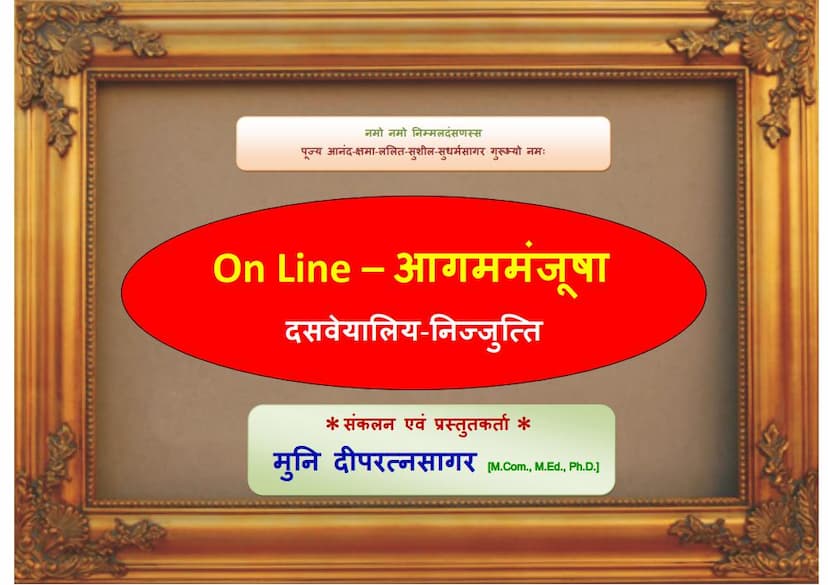Aagam Manjusha N 42 Dasveyaliy Nijjutti
Added to library: September 1, 2025

Summary
Here's a comprehensive summary of the provided Jain text, "Aagam Manjusha N 42 Dasveyaliy Nijjutti," based on the text itself:
Book Title: Aagam Manjusha N 42 Dasveyaliy Nijjutti (Collection and Presentation by Muni Deepratnasagar) Original Editors (70 years prior): Acharya Shri Anand Sagarsuri M.S. Current Presentation: Presented online after 70 years with some modifications. Publisher: Deepratnasagar Author(s) of the Original Work: Anandsagarsuri, Sagaranandsuri (indicated by the preface about the original editing). However, the "Nijjutti" itself is attributed to Shri Bhadrabahuswami (page 11, line 372).
Overall Purpose:
This work is the "Nijjutti" (commentary/elaboration) on the Dashavaikalika Sutra, a significant Jain scripture. The presentation aims to make this important text accessible online, building upon a previous edition.
Key Content and Structure:
The text is a detailed explanation of the Dashavaikalika Sutra, structured chapter by chapter (Adhyayana). Each chapter's commentary (Nijjutti) is presented, often explaining its core themes, concepts, and the meaning of its terms. The core of the text is the Gujarati/Prakrit verses (Nijjutti) followed by explanations, and occasional "Bhashya" (commentary on the commentary).
Core Themes and Concepts Explained:
The text elaborates on various aspects of Jain philosophy and practice as found in the Dashavaikalika Sutra, including:
- The Nature of the Soul (Jiva): Discussions on the soul's existence, its attributes (consciousness, perception, knowledge), its relationship with the body, and its journey through transmigration (samsara). It emphasizes that the soul is distinct from the body, eternal, and characterized by its own consciousness.
- Karma: The concept of karma, its various types, how it binds the soul, and the process of its shedding (nirjara) through practices like austerities and virtuous conduct.
- Right Faith, Knowledge, and Conduct (Samyak Darshan, Gyan, Charitra): These are presented as the path to liberation. The text emphasizes their importance and the qualities associated with them.
- Austerities (Tapas): Both external (bahya) and internal (abhya) austerities are described as crucial for spiritual progress and the purification of the soul.
- Discipline and Restraint (Samyam): The importance of controlling the senses, mind, and speech is repeatedly highlighted.
- The Ideal Monk (Bhikkhu/Samana): The text details the characteristics of an ideal monk, including their conduct, detachment, knowledge, and adherence to vows and disciplines. This includes discussions on their daily practices, food habits (esana), and detachment from worldly possessions.
- Types of Conduct and Practices: The text explains various categories of conduct, such as 'Achar' (conduct), 'Vyavahar' (social conduct), 'Pravachana' (teachings), and 'Drishti' (viewpoints).
- Language and Interpretation: The text delves into the nuances of Jain scriptures, explaining concepts like 'Nikshepa' (classification), 'Nirukti' (etymology), and the importance of proper interpretation. It also discusses different types of discourse and their purpose.
- Qualities and Virtues: Various virtues like patience (kshaanti), humility (vinaya), non-violence (ahimsa), truthfulness (satya), and detachment are elaborated upon.
- The Purpose of Austerities and Practices: The text explains how different practices lead to the shedding of karma and the attainment of liberation.
- Philosophical Debates and Arguments: It addresses potential doubts and arguments, refuting incorrect views and establishing the correctness of Jain teachings. This includes discussions on the nature of existence, the eternality of the soul, and the refutation of nihilistic views.
- The Importance of Dharma (Righteousness): Dharma is consistently portrayed as the highest good and the means to attain ultimate happiness and liberation.
Specific Chapters (Adhyayanas) Covered and Their Themes (as indicated in the text):
The text provides a detailed breakdown of the chapters of the Dashavaikalika Sutra and their respective commentary:
- Chapter 1 (Drum Pushpika): Focuses on praise of Dharma, and understanding the essence of Dharma.
- Chapter 2 (Piti Sakat): Discusses forming a connection with Dharma.
- Chapter 3 (Aachara Katha): Explains self-restraint and discipline.
- Chapter 4 (Jiva Samyama): Deals with the restraint of the soul.
- Chapter 5 (Bhikkhu Vishuddhi): Focuses on the purity of monks and the qualities of restraint.
- Chapter 6 (Aachara Katha - Mahati): Discusses great conduct suitable for noble individuals.
- Chapter 7 (Vayana Vibhakti): Deals with the articulation and clear expression of speech.
- Chapter 8 (Pranidhana): Focuses on mindfulness and concentration.
- Chapter 9 (Vinaya): Explains humility and respect.
- Chapter 10 (Samanikya): Concludes with the essence of being a monk.
- Chulika Chapters: Two additional chapters discussing strengthening one's resolve and the benefits of diverse conduct.
Key Methodologies Used in the Nijjutti:
- Nikshepa: Classification and categorization of concepts.
- Nirukti: Etymological explanations of terms.
- Upaaya (Means/Methods): Explaining the practical application of principles.
- Thavana (Establishment/Representation): Describing the symbolic representations of concepts.
- Hetu (Reasoning/Proof): Providing logical justifications for assertions.
- Udaharana (Examples): Using illustrative stories and analogies to clarify complex ideas.
- Vichara (Inquiry/Analysis): Deep examination of various aspects.
The Presentation's Modifications:
The preface mentions that the online presentation includes:
- Original sutras along with their Nijjutti.
- Inclusion of Bhashya where relevant.
- Inclusion of an alternative text ("Panchakalpa") and its Bhashya.
- Inclusion of "Pindanijjutti" as an alternative to "Oghaniyuti," with a changed printing location.
- Inclusion of "Kalpa (Barasa) Sutra."
Significance:
This work serves as a vital commentary for understanding the Dashavaikalika Sutra, providing deep insights into Jain ethics, philosophy, and the path to spiritual liberation. The modern online presentation makes this important scripture accessible to a wider audience.
In essence, the "Aagam Manjusha N 42 Dasveyaliy Nijjutti" is a scholarly and comprehensive commentary that illuminates the profound teachings of the Dashavaikalika Sutra, guiding the reader towards spiritual understanding and practice.